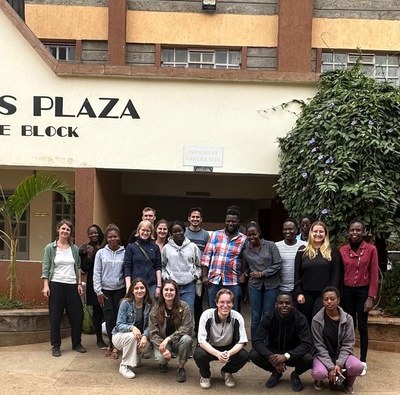Study Project: Global South Geographies of (Urban) Food Systems. Mapping the Example of Nairobi’s Neighborhoods.

From the 2nd of August until the 12th of August, a group of Kenyan and German students conducted the field work of their study project together in Nairobi, Kenya. The main goal was to explore the food system in the urban region of Kasarani a Constituency of Nairobi. Various methods, such as mapping and interviews, were the chosen tools to gain insights into the people's food security status and the different factors that influence it.
The study project was divided into two main parts. The first part was the reading component, which took the form of a block course held in Germany. During this course, theoretical basics of agri-food systems were introduced. Consequently, participants received information about (urban) food systems in Kenya, along with insights into the associated social contradictions, agricultural value chains, and details about the city's history. The second part of the study project revolved around mapping food retailers in Kasarani, with students working in small groups of five during the fieldwork phase. The mapping process was primarily conducted during the first week of our fieldwork. To familiarize ourselves with the topic, we conducted ethnographic inspections and documented it through photography in Kasarani. As the mapping process proceeded rapidly, the groups managed to allocate time during the first week for individual group work. From the outset of the block seminar, the entire group had been divided into four groups based on the student's area of interest.
The first group, titled "Current Local, Informal Value Chains in Nairobi," formulated their research question as: "The Process of Formalization of Food Markets in Nairobi – Chances and Challenges." They discovered opportunities in the existing infrastructure (water, electricity, sanitation, etc.), but they also identified challenges such as investment risks, customer acceptance issues, and the forced relocation of traders. The second group, under the title "Urban Food Security and Malnutrition in Kenya, Nairobi," explored the relationship between "Urban Food Security and Malnutrition" and the changing food retail sector in the Kasarani area. The third group did their research on "The Urban Food Trade System in Nairobi" and explored the impact of the Covid-19 pandemic on informal food retailers in the Clayworks and Hunters areas within the Kasarani constituency of Nairobi, Kenya. Their findings revealed that traders faced various challenges during the pandemic, including a drop in customers, higher prices, Covid-19-related restrictions like lockdowns, and increased expenses due to hygiene regulations. The topic of the fourth and final group was "Food Consumption: A Question of Class and Income". The work was divided into two sub-research questions: "How does social inequality influence food consumption in Kasarani?" and "How are gender-related factors expressed in the dynamics of food at the household level?". The results highlighted the significant influence of socio-economic class on daily life concerning food consumption.
In summary, this study project provided the students with a unique opportunity to work together in an intercultural context, examining the food systems in Nairobi from various angles. The work in an intercultural context has enriched the cultural awareness and mutual sensitivity.
